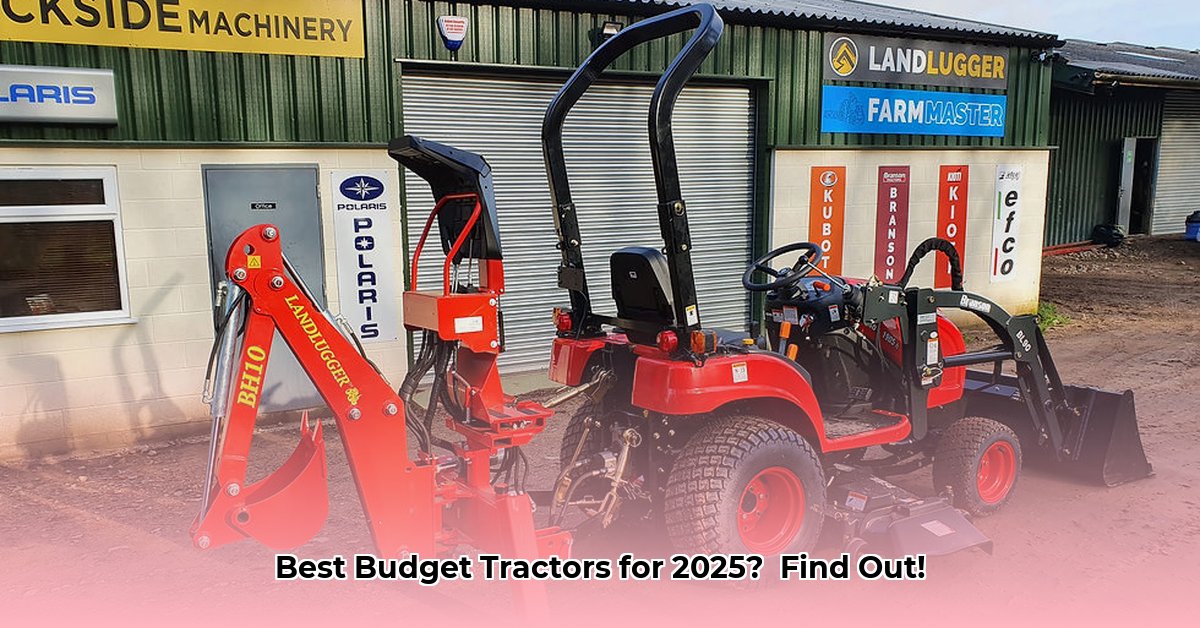
Finding the right tractor for your farm shouldn't break the bank. This guide helps small-scale farmers navigate the world of budget-friendly tractors, offering actionable advice and brand comparisons to make an informed decision. We'll cover everything from assessing your needs to securing the best financing options. For more tractor comparisons, check out this helpful resource: Tractor Comparison Tool.
Defining Your Farm's Needs: A Crucial First Step
Before diving into tractor brands, understanding your farm's specific requirements is paramount. Think of this as creating a blueprint for your tractor purchase. Answer these questions:
- Acreage: How many acres do you farm? Smaller farms (under 20 acres) typically benefit from sub-compact tractors, while larger operations might require more powerful models.
- Primary Tasks: What are your main farming tasks? Mowing, plowing, tilling, hauling? Different tasks demand different horsepower and features. A simple mowing operation requires significantly less power than tilling heavy clay soil.
- Terrain: Is your land flat, hilly, or a mix? Hilly terrain necessitates a more robust and stable tractor. Flat land offers greater flexibility in tractor choice.
- Climate: Consider your local climate. Extreme temperatures can affect engine performance and startup, making cold-weather starting capability a crucial factor in some regions.
These factors significantly influence the horsepower, features, and overall suitability of a tractor for your farm’s needs. Choosing the right tractor prevents overspending on unnecessary power or features.
Top Budget Tractor Brands for 2025: A Comparative Analysis
Several reputable manufacturers offer excellent sub-compact tractors at competitive prices. Remember that prices are estimates and vary based on model, features, and location. Always obtain multiple quotes from local dealers before making a purchase.
| Brand | Pros | Cons | Estimated Price Range (Sub-compact) |
|---|---|---|---|
| Mahindra | Affordable, readily available parts, strong dealer support in many regions | Some models may lack advanced technological features. | $14,000 - $18,000 |
| Massey Ferguson | Dependable reputation, generally good resale value, strong parts availability | Might be slightly pricier than some entry-level competitors. | $16,000 - $20,000 |
| New Holland | Extensive dealer network, well-established brand name | Fewer budget models compared to some competitors. | $15,000 - $19,000 |
| Kioti | Known for fuel efficiency and durability, growing popularity | Parts availability might be slightly less convenient in certain regions. | $15,000 - $18,000 |
| Yanmar | Exceptionally long-lasting engines, high build quality | Often at a higher price point than some competitors, fewer dealers in some areas | $17,000 - $22,000 |
| LS Tractor | Good value for the money, rapidly expanding brand with increasing dealer reach | Dealer network may be less extensive than established brands in certain regions | $14,000 - $17,000 |
| Steiner | Simpler machines, often easier to maintain and repair; good for simpler technology preference | Fewer advanced features compared to some competitors. | $14,000 - $16,000 |
Essential Tractor Features: Power, Performance, and Versatility
Understanding key features is critical for selecting the right tractor. Don't get bogged down in technical jargon; focus on how these features impact your farming tasks.
- Horsepower (HP): The power output of your tractor. Consider the most demanding tasks you'll perform; more horsepower provides greater capability for heavy-duty jobs like plowing tough soil or running larger implements.
- PTO (Power Take-Off): This transmits power from the tractor's engine to implements like tillers and mowers. Ensure compatibility between your tractor and your chosen implements.
- 3-Point Hitch: The system that connects implements to the rear of the tractor. It's crucial for versatility and ease of attaching various tools.
- Lift Capacity: The maximum weight the tractor can lift with its 3-point hitch. Essential for handling heavier implements and tasks.
- Optional Attachments: Consider future needs. A front-end loader or backhoe can greatly enhance your tractor's capabilities and overall long-term investment value.
Buying Your Tractor: A Step-by-Step Guide
Purchasing a tractor requires careful planning and due diligence. Follow these steps to ensure a successful outcome:
- Research: Thoroughly research different models and brands. Read online reviews and seek advice from other farmers. Online forums and agricultural communities can be excellent resources.
- Obtain Multiple Quotes: Contact at least three dealers to compare prices and financing options. Dealers are often willing to negotiate, particularly during off-peak seasons.
- Pre-Purchase Inspection (Used Tractors): For used tractors, a comprehensive inspection by a qualified mechanic is vital. Verify maintenance records for a clear view into the tractor’s operational history.
- Warranty: Carefully review the warranty terms and conditions. Understand what's covered and for how long. A robust warranty provides protection against unexpected repairs.
- Financing: Explore financing options if needed. Dealers often provide financing, but comparing rates with your bank is advisable to secure the best terms.
Maintenance and Long-Term Costs: Investing in Your Future
Regular maintenance is key to extending your tractor's lifespan and minimizing long-term costs. Factor in expenses like oil changes, filter replacements, and potential repairs. Fuel efficiency contributes significantly to both your budget and environmental sustainability. A fuel-efficient tractor reduces operating costs and minimizes your carbon footprint.
Choosing the right budget tractor is a crucial investment. By understanding your specific needs, comparing brands, and following this guide's steps, you can confidently acquire a reliable and cost-effective tractor that helps your farm thrive for years to come. Remember that the agricultural technology landscape is constantly evolving, so continuous research will ensure you make the best decision for your farm's future.